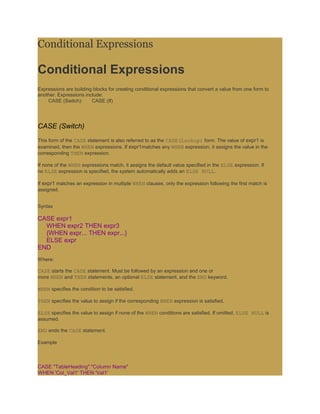Conditional expressions
- 1. Conditional Expressions Conditional Expressions Expressions are building blocks for creating conditional expressions that convert a value from one form to another. Expressions include: ĄĪ CASE (Switch)ĄĪ CASE (If) CASE (Switch) This form of the CASE statement is also referred to as the CASE(Lookup) form. The value of expr1 is examined, then the WHEN expressions. If expr1matches any WHEN expression, it assigns the value in the corresponding THEN expression. If none of the WHEN expressions match, it assigns the default value specified in the ELSE expression. If no ELSE expression is specified, the system automatically adds an ELSE NULL. If expr1 matches an expression in multiple WHEN clauses, only the expression following the first match is assigned. Syntax CASE expr1 WHEN expr2 THEN expr3 {WHEN expr... THEN expr...} ELSE expr END Where: CASE starts the CASE statement. Must be followed by an expression and one or more WHEN and THEN statements, an optional ELSE statement, and the END keyword. WHEN specifies the condition to be satisfied. THEN specifies the value to assign if the corresponding WHEN expression is satisfied. ELSE specifies the value to assign if none of the WHEN conditions are satisfied. If omitted, ELSE NULL is assumed. END ends the CASE statement. Example CASE "TableHeading"."Column Name" WHEN 'Col_Val1' THEN 'Val1'
- 2. WHEN 'Col_Val2' THEN 'Val2' WHEN 'Col_Val3' THEN 'Val3' ELSE "TableHeading"."Column Name" END In this example, the WHEN statements must reflect a strict equality. CASE (If) This form of the CASE statement evaluates each WHEN condition and if satisfied, assigns the value in the corresponding THEN expression. If none of the WHEN conditions are satisfied, it assigns the default value specified in the ELSE expression. If no ELSE expression is specified, the system automatically adds an ELSE NULL. Syntax CASE WHEN request_condition1 THEN expr1 {WHEN request_condition2 THEN expr2} {WHEN request_condition... THEN expr...} ELSE expr END Where: CASE starts the CASE statement. Must be followed by one or more WHEN and THEN statements, an optional ELSE statement, and the END keyword. WHEN specifies the condition to be satisfied. THEN specifies the value to assign if the corresponding WHEN expression is satisfied. ELSE specifies the value to assign if none of the WHEN conditions are satisfied. If omitted, ELSE NULL is assumed. END ends the CASE statement. Example CASE WHEN ("TableHeading"."ColumnName1"='Collaboration' AND "TableHeading"."ColumnName"='Value1') THEN 'Val1' WHEN ("TableHeading"."ColumnName1"='Collaboration' AND "TableHeading1"."ColumnName2"='Value2') THEN 'Val2' WHEN "TableHeading"."Column Name"='Value3' THEN 'Val3' ELSE "TableHeading"."Column Name"
- 3. END Note : Unlike the Switch form of the CASE statement, the WHEN statements in the If form allow comparison operators. In a CASE statement, AND has precedence over OR.



